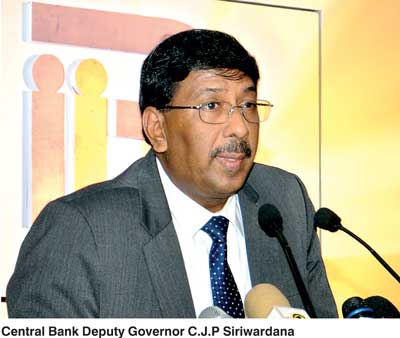Tuesday Feb 17, 2026
Tuesday Feb 17, 2026
Monday, 2 April 2018 00:00 - - {{hitsCtrl.values.hits}}
By Uditha Jayasinghe
The Central Bank is readying to introduce a slew of new regulations on microfinance companies, including implementing a depositor insurance scheme, issuing directives on governance, and reporting client information to the Credit Information Bureau, as part of efforts to bring the industry in line with banks and finance companies.
Central Bank Deputy Governor C. J. P. Siriwardena told a gathering at the launch of Berendina Micro Investments Company (BMIC) held recently that new measures would be brought in to increase the credibility of microfinance companies, protect thousands of customers, and reduce high levels of indebtedness in several parts of the country.

“Microfinance has enabled the unbankable population to have access to finance and improve their living standards. Lately we have observed that these inherent objectives of microfinance are not apparent in some microfinance providers. This inevitably deprives the sector of microfinance business of the true essence of its operation,” he said.
The Deputy Governor observed that fraudulent microfinance companies are a “menace to their genuine counterparts” and noted the industry supported customer protection regulation, believing it extremely important at this juncture.
“Corporate governance directive for the microfinance companies is also to be issued in the near future. The key aspects to be addressed through this direction are Board of Director composition, their responsibilities and functions, regulations of related party transactions and disclosures. These are the key areas to be covered under this governance framework. Through this new framework it is expected to promote self-regulation as good governance of microfinance business in the country,” he added.
The Central Bank is taking action to draft necessary regulation to make it compulsory to report financial operations of licensed microfinance companies to the Credit Information Bureau or CRIB to maintain customer records of clients attached to microfinance companies, similar to the banks and finance companies. The Central Bank expects this information to streamline the analysis of creditworthiness of borrowers and minimise indebtedness, currently seen as a serious problem in some parts of the country.
“To safeguard depositors, a depositor insurance scheme, similar to banks and finance companies is expected to be activated to cover microfinance companies in the future. The insurance scheme begun for banks and finance companies about a decade ago is now a Rs. 44 billion fund and grows about Rs. 10 billion each year. This allows the regulator to meet any shocks in the financial market and a similar arrangement would be introduced to microfinance companies. “
Ultimately it is the Central Bank’s view that organisations which obtain deposits need to be regulated similarly to banks and finance companies. However, microfinance institutions that do not take public deposits need not be under strict prudential regulations, the Deputy Governor observed. Such institutions may operate under several globally accepted market conduct regulations in order to ensure customer protection, stated Siriwardena. “Microfinance companies that come under regulation will also prosper due to increased credibility. This will benefit customers as well.”
Berendina’s is considered to be Sri Lanka’s largest microfinance company, having provided services since 2007. In keeping with the Central Bank’s new licensing requirements, the microfinance services are now operated by a new company ‘Berendina Micro Investments Company’ (BMIC).
BMIC is owned by Berendina Development Services (BDS). BMIC currently serves over 107,000 families in 10 districts of the country, both in rural and plantation areas. BMIC offers the lowest interest rate in the industry, its officials said.
“Berendina has come a long way and done lot of work to reduce poverty in the country, over the years. But we have not spoken about or publicised what we have been doing, which must change. We must now take our message out to the people, so we can do much more, getting closer to our ultimate goal of completely eradicating poverty from Sri Lanka,” said BMIC Chairman Jagath Godakanda.
The loan amount disbursed in 2017 is over Rs. 3.5 billion, and the organisation also provides entrepreneurship training and advice to its clients, forging long-term relationships with them and connecting them to markets.
Pic by Ruwan Walpola